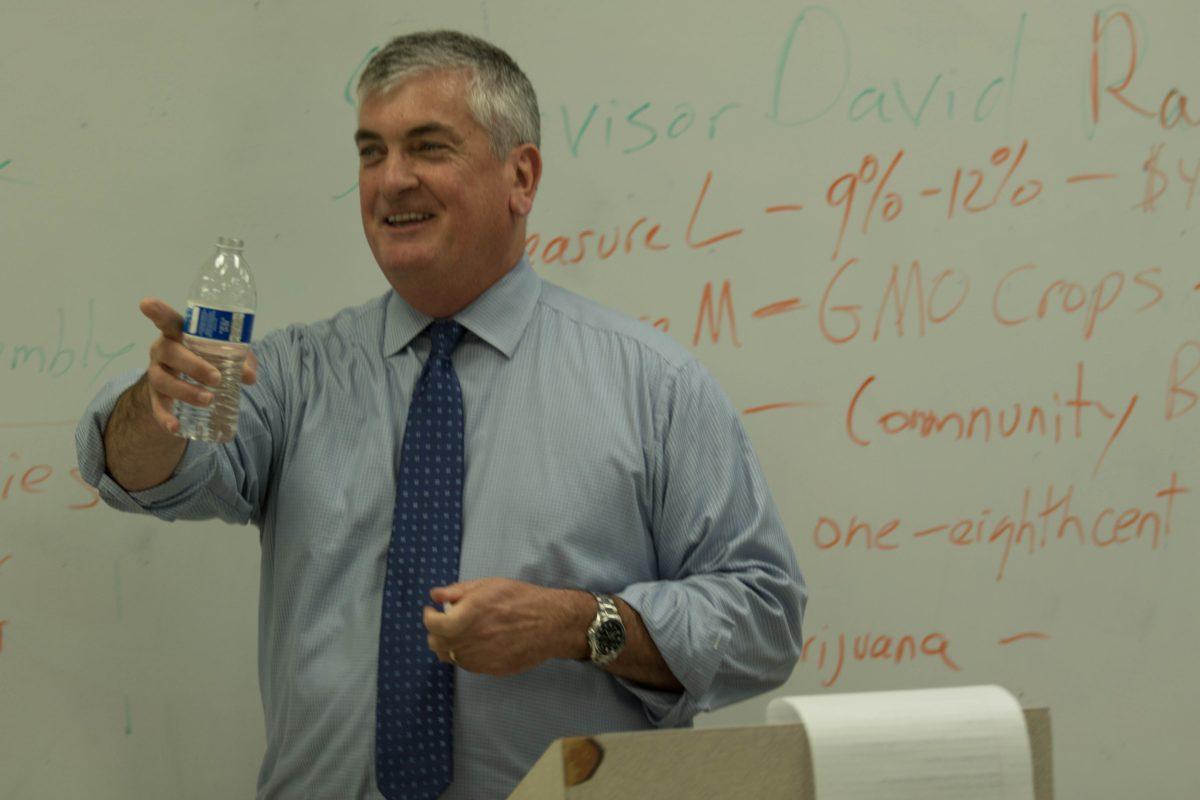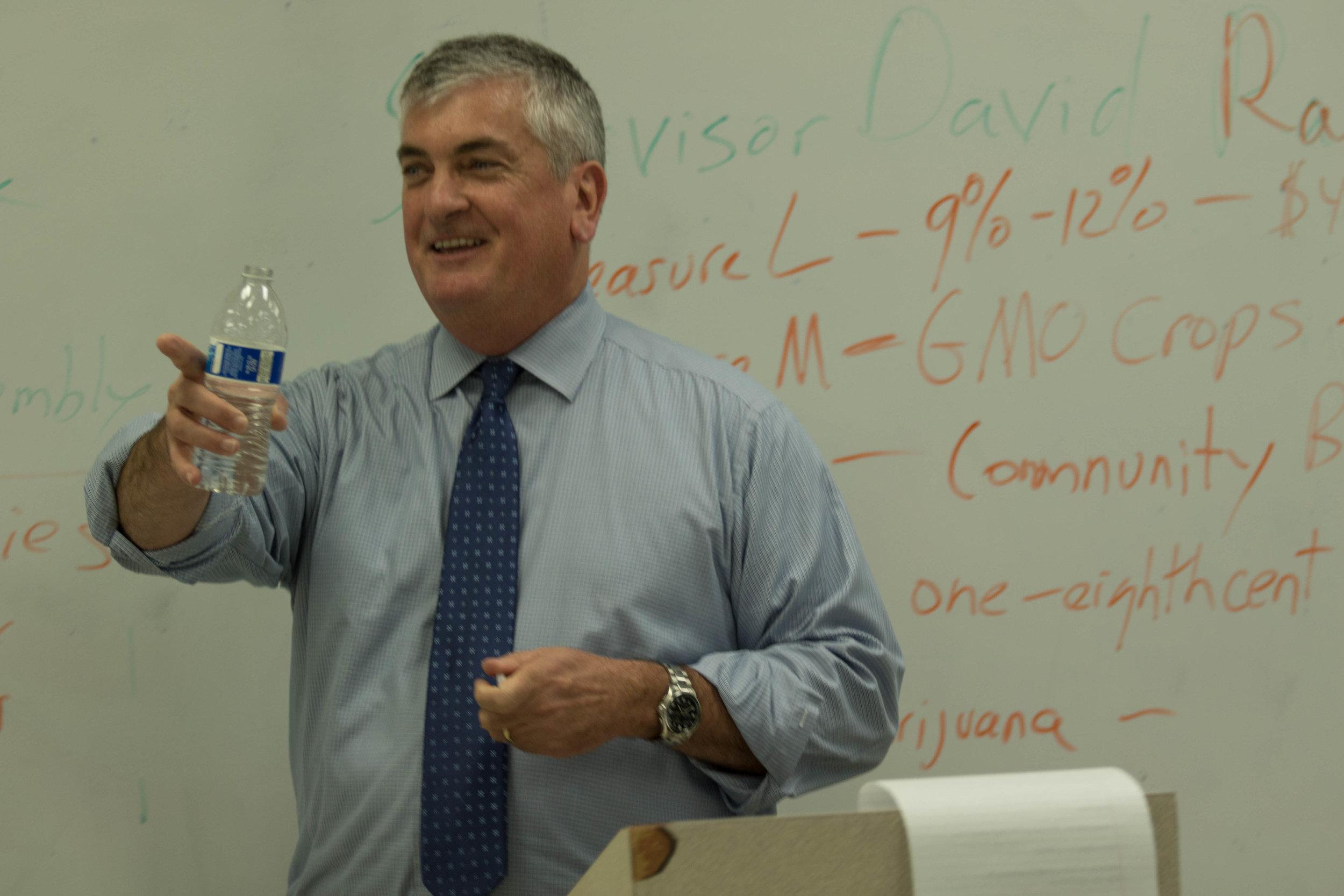David Rabbitt, one of the five supervisors representing Sonoma County, met with the Sonoma State STAR on Tuesday to weigh in on issues concerning the county such as ballot measures and propositions. Rabbitt represents the southern part of Sonoma County, including the area around Sonoma State University. His district is composed of the entire city of Petaluma, Cotati and three precincts in Rohnert Park. Rabbitt is an architect by profession and practiced for 28 years before being elected to the Petaluma City Council. Rabbitt currently serves as the director of the Sonoma County Water Agency, commissioner on the California Seismic Safety Commission, appointed by Gov. Jerry Brown, and serves on the board of directors for Sonoma-Marin Area Regional Transit train and the Golden Gate Bridge. What follows is an edited transcript of that discussion.
STAR: How long have you been involved in Sonoma County?
Rabbitt: It’s been six years on Board of Supervisors and four years on Petaluma City Council. So 10 total elected years. Running for supervisor is a bit of a different gig from the council because it’s a much larger organization; we are the largest employer in the county with about 4,100 total employees, 27 different departments and $1.65 billion budget.
STAR: SMART is starting with 10 stations and then there are going to be a few added stations later in Windsor, Healdsburg and Cloverdale. Is that now pushed back because you have announced that SMART trains won’t be operating until the Spring?
Rabbitt: What we call now “The initial operating system” is a truncated version of what was envisioned way back when it first went through. It was envisioned to be 71 miles and now it’s somewhere around 49 to Larkspur. That’s what we have the money for and will complete. The piece to Larkspur was added on after the fact. That was about a $40 million add-on, $20 million through the president’s budget. That was a good thing. That’ll get added in later, the piece further north is really not there yet. What’s not funded is to go all the way to Cloverdale. That has to be in a totally separate financial drive going forward.
STAR: Why is the SMART train being delayed?
Rabbitt: It’s a culmination of things.. As they work through the testing phase, the trains are going faster and each time they run. they have to go back and tweak the software. This was all anticipated. We are at the place we should be at this point in time. We also have some brake issues that they are working through.
Not that they can’t stop, but they want to make sure they all work smoothly. The latest thing is the engine. It’s the connection with the gear shaft. They have to pull those out and redo some pieces in there.
For me, while you set a date and you want to start service by that date for certain, I don’t think you start until you’re 100 percent ready to go. It’s more important you give everyone the best possible experience. You don’t want to open up early. I think it will more realistically be ready in April.
STAR: Will there be any change to the cost of fares?
Rabbitt: I was one of two that actually thought the fares were too high when we set them. My view is that we need to try get people on the train, give them a chance to ride it and see how great it is, and then hopefully they will get hooked and say,”That’s the way I want to go to work or school.” I think we accomplish that by having a fare that is set to be attractive.
Why push the numbers higher when you can have fares be a little lower, attract more people and more ridership, especially being a brand new entity. Why don’t we have it be free? Everyone should get at least a free ride on the train. We want to attract people so they can hopefully come back again and again. I do think we will revisit fares. They are adjusting it; there may be a school year pass for students.
STAR: Measure M, banning GMO crops, are you against it?
Rabbitt: For me the science/ evidence isn’t there. You can ban GMOs for lots of other reasons. It’s a marketing thing, in my opinion. It’s not the same thing as organic. We don’t have any GMO crops in this county. No other counties in California have really banned GMOs so I don’t think we want to go down that path.
One of the arguments against Measure M is that we have a lot of grapes here, about 65,000 acres of grapes. It’s a huge money crop for a lot of people. It makes the county a lot of money as well. There might be something over the horizon that might be GMO (Genetically Modified Organism) that will use less pesticides and herbicides and will be something that won’t be a problem. Why would we want to preclude ourselves from that? I think a lot of people would see it as something we should capitalize on and not put ourselves in a box.
STAR: What is your position on Proposition 64?
Rabbitt: Twenty years ago, we passed Prop. 45, something that we all thought was a very compassionate thing to do for those that were dying of cancer, and we ended up with dispensaries and all sorts of other issues that we had never thought of. Dispensaries were not even mentioned in that initiative.
What’s not mentioned in this one that will come up? The business is already here in Sonoma County. I don’t think we should see it as the cash cow that we really want to capitalize on, epecially if it becomes a bigger business, you still have the federal issues. Much of the rural crime and certainly a huge number of the homicides in the county are marijuana-related. Maybe not the marijuana itself but certainly the bags of money that are there. I know we want to do the right thing and not spend money chasing something that isn’t legal when it is prevalent and everything else, but I just think we need to be smart about it. I’m not convinced it’s really the place we want to be right now.
STAR: What are your thoughts on Measure L and do you support it?
Rabbitt: Yes. L is the 3 percent increase in the transient occupancy tax (TOT). The hotel tax. We have 7.5 million visitors to Sonoma County every year, which is great, we’re a popular place to be, but this creates a lot of pressure on the government entities. We need to make sure we can have a funding source to make sure the tourists do pay for what is needed. The TOT tax can also provide funding for many community-serving entities.
STAR: Are we on track to finish the wideninfg ofHighway 101 to Marin?
Rabbitt: I think the No. 1 one transportation priority for the North Bay, SMART train excluded, is really to get the Narrows complete as quickly as possible. We did refinance our own bonds from the Sonoma County Transportation Authority, which freed up some capacity. We’re doing a deal with the Metropolitan Transit Commission, and we’ve cobbled together enough to get the next section done. Sometimes it’s just incremental, getting as much money we can to afford these things. We will still have a gap through Petaluma, which is $85 million, so if anyone has any extra change around just let us know.
STAR: The CSU just released a plan to increase tuition, how do you feel about that?
Rabbitt: I feel your pain, having two kids out of college and one in. Education is so important and the cost has seemed to go up disproportionately to the Consumer Price Index. Why is that? It seems to go up to the amount that the allowable student loans are at any given time. I find this awfully convenient that it matches that. In my mind, it’s a state issue that they really need to make a priority.
STAR: What is your view on Measure Y, a tax increase to support county barriers?
Rabbitt: I support it. We got it on the ballot. I think our library system over the course of time has changed and has needed to adapt. Libraries today fulfill a place in society for those folks who don’t have access to computers. It is and should also be a place everyone enjoys. We need to have a solid library system just like we need to have a solid educational system at all levels in Sonoma County. It’s a wise thing to invest in. an eighth of a cent (tax increase) is really affordable.
STAR: Is there another way to appropriate the funds for libraries without increasing the sales tax?
Rabbitt: It would still go to a vote of the people, I’m sure you could do it from a parcel tax. When Prop. 13 came through, it kind of froze everything at that particular point in time, then set certain percentages of who’s getting what. Prop 13 depending on where you live, allows you to increase your property tax by a certain percentage. The library originally started at such a low place they could never truly catch up. They also had issues for a year with labor. They ended up cutting hours , and that was not very popular. Long answer short, yes there are other ways to do it, but I think they see this as a way that is probably the most efficient and simple.




































